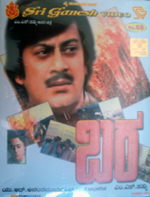Tags
A few years before he spread UR Ananthamurthy’s short story Bara over few reels of film, MS Sathyu had directed Garam Hawa. The much-celebrated Balraj Sahni-starrer was about the trauma of Partition and hence had polarised opinions. Watching it while we were well into the 21st century, Garam Hawa seemed tame. Watching Bara almost 30 years after its first release, it seems amateurish.
An honest bureaucrat works towards solving a serious drought issue in his jurisdiction in north Karnataka and realises soon that not all want it that way. There are politicians and politics aplenty and though the mood is grim, the bureaucrat’s fervent push to overcome problems both man-made and natural provides the film with a rustic energy. If anything, the strange brown tint of the film syncs well with the discomfort caused by dishonesty, dust and drought.
Ananth Nag and CR Simha play key roles and luckily, the only adequate performances come from them. So bad is the support cast that you really wish the District Collector (Ananth Nag) gets into more trouble so as to keep him on screen as much as possible. Yet, imagining the cost of making a film and the need to get a scene right first time, the other performances are excusable. Still, how do you get over that strange, gratuitous character of Ravi! Unless the DVD had cut something significant, he appears as the bureaucrat’s unhappy wife’s confidant for most part. At one instance, a fleeting moment in fact, he appears as a serious threat to the bureaucrat’s marriage and towards the end, thank heavens, you are told he does have a job, of that of a police officer. And now put a face you know to Ravi, Pankaj Dheer, Karna from Mahabharatha, and see how bizarre it is.
Some of the other fringe characters are just as strange. The wife, the father, the Chief Minister (his two hands, rather)… the extras… all struggle to fit in. And they don’t. The story is of course predictable. There is the famine, there is the famine of honesty, then there is the famine of reason and suddenly, as if to just tick a box, there are communal riots as well. Yet, a lot of it works, for one reason.
Ananth Nag is excellent as the lead. He makes you want to know what happens to him. When he goes by his gut feeling to support a person who may be dishonest, you go with his gut feeling. He chides his father for being irrational in his religiousness, but backs a blind man to find ground water with a stick. You still go with him because you know he is earnest. He may be wrong, but he is earnest.
That in effect is the film’s strong point. You may notice the occasional hand-held shots indoors, you may find CR Simha endurable (not with his Marathi though), but, but for Ananth Nag, this can’t do much more than what a reading of Ananthamurthy’s story may do.

Garam Hawa is a movie I saw decades ago and in those movie famished times it made some impression. What has remained in the mind is the quawalli about Salim Chishti.
Nice write.
I can understand that Garam Hawa was a very important film in those times given it came just a generation after Partition. I simply lost it from the beginning and only remember that final scene with Balraj Sahni having to make a key choice. But then, maybe I saw it before I should have 🙂
Here’s that qawwali:
Wow! Thanks Vivek! What a gift! This is a song that has lain in the vaults of my mind and (I just stored it in my “favourites” folder) and it was like hearing a voice from another lifetime. I’m rather overwhelmed. It still sounds good though I am a different man. Thanks again, this was nice of you.
No problem. Even I remembered the song after seeing the video.
That comments issue on the Perpendicular blog might have been solved. But still wouldn’t let me add your blog URL.